135 books about Macroeconomics and 7
start with B
135 books about Macroeconomics and 7
135 books about Macroeconomics
7 start with B start with B
7 start with B start with B
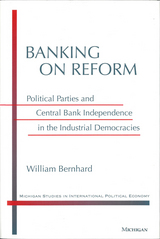
Banking on Reform
Political Parties and Central Bank Independence in the Industrial Democracies
William Bernhard
University of Michigan Press, 2002
Banking on Reform examines the political determinants of recent reforms to monetary policy institutions in the industrial democracies. With these reforms, political parties have sought to draw on the political credibility of an independent central bank to cope with electoral consequences of economic internalization and deindustrialization.
New Zealand and Italy made the initial efforts to grant their central banks independence. More recently, France, Spain, Britain, and Sweden have reformed their central banks' independence. Additionally, members of the European Union have implemented a single currency, with an independent European central bank to administer monetary policy.
Banking on Reform stresses the politics surrounding the choice of these institutions, specifically the motivations of political parties. Where intraparty conflicts have threatened the party's ability to hold office, politicians have adopted an independent central bank. Where political parties have been secluded from the political consequences of economic change, reform has been thwarted or delayed. The drive toward a single currency also reflects these political concerns. By delegating monetary policy to the European level, politicians in the member states removed a potentially divisive issue from the domestic political agenda, allowing parties to rebuild their support constructed on the basis of other issues. William T. Bernhard provides a variety of evidence to support his argument, such as in-depth case accounts of recent central bank reforms in Italy and Britain, the role of the German Bundesbank in the policy process, and the adoption of the single currency in Europe. Additionally, he utilizes quantitative and statistical tests to enhance his argument.
This book will appeal to political scientists, economists, and other social scientists interested in the political and institutional consequences of economic globalization.
William T. Bernhard is Assistant Professor of Political Science, University of Illinois, Urbana-Champaign.
New Zealand and Italy made the initial efforts to grant their central banks independence. More recently, France, Spain, Britain, and Sweden have reformed their central banks' independence. Additionally, members of the European Union have implemented a single currency, with an independent European central bank to administer monetary policy.
Banking on Reform stresses the politics surrounding the choice of these institutions, specifically the motivations of political parties. Where intraparty conflicts have threatened the party's ability to hold office, politicians have adopted an independent central bank. Where political parties have been secluded from the political consequences of economic change, reform has been thwarted or delayed. The drive toward a single currency also reflects these political concerns. By delegating monetary policy to the European level, politicians in the member states removed a potentially divisive issue from the domestic political agenda, allowing parties to rebuild their support constructed on the basis of other issues. William T. Bernhard provides a variety of evidence to support his argument, such as in-depth case accounts of recent central bank reforms in Italy and Britain, the role of the German Bundesbank in the policy process, and the adoption of the single currency in Europe. Additionally, he utilizes quantitative and statistical tests to enhance his argument.
This book will appeal to political scientists, economists, and other social scientists interested in the political and institutional consequences of economic globalization.
William T. Bernhard is Assistant Professor of Political Science, University of Illinois, Urbana-Champaign.
[more]
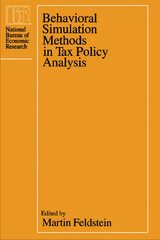
Behavioral Simulation Methods in Tax Policy Analysis
Edited by Martin Feldstein
University of Chicago Press, 1983
These thirteen papers and accompanying commentaries are the first fruits of an ongoing research project that has concentrated on developing simulation models that incorporate the behavioral responses of individuals and businesses to alternative tax rules and rates and on expanding computational general equilibrium models that analyze the long-run effects of changes on the economy as a whole.
The principal focus of the project has been on the microsimulation of individual behavior. Thus, this volume includes studies of individual responses to an over reduction in tax rates and to changes in the highest tax rates; a study of alternative tax treatments of the family; and studies of such specific aspects of household behavior as tax treatment of home ownership, charitable contributions, and individual saving behavior. Microsimulation techniques are also used to estimate the effects of alternative policies on the long-run financial status of the social security program and to examine the effects of alternative tax rules on corporate investment and of foreign-source income on overseas investment.
The papers devoted to the development of general equilibrium simulation models to include an examination of the implications of international trade and capital flows, a study of the effects of capital taxation that uses a closed economy equilibrium model, and an examination of the effect of switching to an inflation-indexed tax system. In the volume's final paper, a life-cycle model in which individuals maximize lifetime utility subject to a lifetime budget constraint is used to simulate the effects of tax rules on personal savings.
The principal focus of the project has been on the microsimulation of individual behavior. Thus, this volume includes studies of individual responses to an over reduction in tax rates and to changes in the highest tax rates; a study of alternative tax treatments of the family; and studies of such specific aspects of household behavior as tax treatment of home ownership, charitable contributions, and individual saving behavior. Microsimulation techniques are also used to estimate the effects of alternative policies on the long-run financial status of the social security program and to examine the effects of alternative tax rules on corporate investment and of foreign-source income on overseas investment.
The papers devoted to the development of general equilibrium simulation models to include an examination of the implications of international trade and capital flows, a study of the effects of capital taxation that uses a closed economy equilibrium model, and an examination of the effect of switching to an inflation-indexed tax system. In the volume's final paper, a life-cycle model in which individuals maximize lifetime utility subject to a lifetime budget constraint is used to simulate the effects of tax rules on personal savings.
[more]
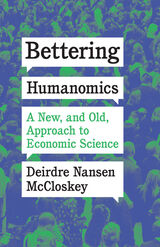
Bettering Humanomics
A New, and Old, Approach to Economic Science
Deirdre Nansen McCloskey
University of Chicago Press, 2021
Deirdre Nansen McCloskey's latest meticulous work examines how economics can become a more "human" science.
Economic historian Deirdre Nansen McCloskey has distinguished herself through her writing on the Great Enrichment and the betterment of the poor—not just materially but spiritually. In Bettering Humanomics she continues her intellectually playful yet rigorous analysis with a focus on humans rather than the institutions. Going against the grain of contemporary neo-institutional and behavioral economics which privilege observation over understanding, she asserts her vision of “humanomics,” which draws on the work of Bart Wilson, Vernon Smith, and most prominently, Adam Smith. She argues for an economics that uses a comprehensive understanding of human action beyond behaviorism.
McCloskey clearly articulates her points of contention with believers in “imperfections,” from Samuelson to Stiglitz, claiming that they have neglected scientific analysis in their haste to diagnose the ills of the system. In an engaging and erudite manner, she reaffirms the global successes of market-tested betterment and calls for empirical investigation that advances from material incentives to an awareness of the human within historical and ethical frameworks. Bettering Humanomics offers a critique of contemporary economics and a proposal for an economics as a better human science.
Economic historian Deirdre Nansen McCloskey has distinguished herself through her writing on the Great Enrichment and the betterment of the poor—not just materially but spiritually. In Bettering Humanomics she continues her intellectually playful yet rigorous analysis with a focus on humans rather than the institutions. Going against the grain of contemporary neo-institutional and behavioral economics which privilege observation over understanding, she asserts her vision of “humanomics,” which draws on the work of Bart Wilson, Vernon Smith, and most prominently, Adam Smith. She argues for an economics that uses a comprehensive understanding of human action beyond behaviorism.
McCloskey clearly articulates her points of contention with believers in “imperfections,” from Samuelson to Stiglitz, claiming that they have neglected scientific analysis in their haste to diagnose the ills of the system. In an engaging and erudite manner, she reaffirms the global successes of market-tested betterment and calls for empirical investigation that advances from material incentives to an awareness of the human within historical and ethical frameworks. Bettering Humanomics offers a critique of contemporary economics and a proposal for an economics as a better human science.
[more]
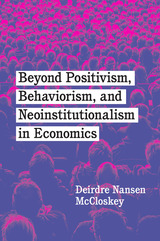
Beyond Positivism, Behaviorism, and Neoinstitutionalism in Economics
Deirdre Nansen McCloskey
University of Chicago Press, 2022
A penetrating analysis from one of the defining voices of contemporary economics.
In Beyond Positivism, Behaviorism, and Neoinstitutionalism in Economics, Deirdre Nansen McCloskey zeroes in on the authoritarian cast of recent economics, arguing for a re-focusing on the liberated human. The behaviorist positivism fashionable in the field since the 1930s treats people from the outside. It yielded in Williamson and North a manipulative neo-institutionalism. McCloskey argues that institutions as causes are mainly temporary and intermediate, not ultimate. They are human-made, depending on words, myth, ethics, ideology, history, identity, professionalism, gossip, movies, what your mother taught you. Humans create conversations as they go, in the economy as in the rest of life.
In engaging and erudite prose, McCloskey exhibits in detail the scientific failures of neo-institutionalism. She proposes a “humanomics,” an economics with the humans left in. Humanomics keeps theory, quantification, experiment, mathematics, econometrics, though insisting on more true rigor than is usual. It adds what can be learned about the economy from history, philosophy, literature, and all the sciences of humans. McCloskey reaffirms the durability of “market-tested innovation” against the imagined imperfections to be corrected by a perfect government. With her trademark zeal and incisive wit, she rebuilds the foundations of economics.
In Beyond Positivism, Behaviorism, and Neoinstitutionalism in Economics, Deirdre Nansen McCloskey zeroes in on the authoritarian cast of recent economics, arguing for a re-focusing on the liberated human. The behaviorist positivism fashionable in the field since the 1930s treats people from the outside. It yielded in Williamson and North a manipulative neo-institutionalism. McCloskey argues that institutions as causes are mainly temporary and intermediate, not ultimate. They are human-made, depending on words, myth, ethics, ideology, history, identity, professionalism, gossip, movies, what your mother taught you. Humans create conversations as they go, in the economy as in the rest of life.
In engaging and erudite prose, McCloskey exhibits in detail the scientific failures of neo-institutionalism. She proposes a “humanomics,” an economics with the humans left in. Humanomics keeps theory, quantification, experiment, mathematics, econometrics, though insisting on more true rigor than is usual. It adds what can be learned about the economy from history, philosophy, literature, and all the sciences of humans. McCloskey reaffirms the durability of “market-tested innovation” against the imagined imperfections to be corrected by a perfect government. With her trademark zeal and incisive wit, she rebuilds the foundations of economics.
[more]

Bleakonomics
A Heartwarming Introduction to Financial Catastrophe, the Jobs Crisis and Environmental Destruction
Rob Larson
Pluto Press, 2012
Bleakonomics is a short and darkly humorous guide to the three great crises plaguing today's world: environmental degradation, social conflict in the age of austerity and financial instability.
Written for anyone who is wondering how we’ve come to this point, Rob Larson holds mainstream economic theory up against the grim reality of a planet in meltdown. He looks at scientists’ conclusions about climate change, the business world’s opinions about its own power, and reveals the fingerprints of finance on American elections.
With a unique and engaging approach to each crucial subject, students, academics and activists will find a lot to appreciate in this quiet call-to-arms for a saner and more stable world.
Written for anyone who is wondering how we’ve come to this point, Rob Larson holds mainstream economic theory up against the grim reality of a planet in meltdown. He looks at scientists’ conclusions about climate change, the business world’s opinions about its own power, and reveals the fingerprints of finance on American elections.
With a unique and engaging approach to each crucial subject, students, academics and activists will find a lot to appreciate in this quiet call-to-arms for a saner and more stable world.
[more]
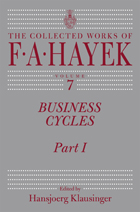
Business Cycles
Part I
F. A. Hayek
University of Chicago Press, 2012
In the years following its publication, F. A. Hayek’s pioneering work on business cycles was regarded as an important challenge to what was later known as Keynesian macroeconomics. Today, as debates rage on over the monetary origins of the current economic and financial crisis, economists are once again paying heed to Hayek’s thoughts on the repercussions of excessive central bank interventions.
The latest editions in the University of Chicago Press’s ongoing series The Collected Works of F. A. Hayek, these volumes bring together Hayek’s work on what causes periods of boom and bust in the economy. Moving away from the classical emphasis on equilibrium, Hayek demonstrates that business cycles are generated by the adaptation of the structure of production to changes in relative demand. Thus, when central banks artificially lower interest rates, the result is a misallocation of capital and the creation of asset bubbles and additional instability. Business Cycles, Part I contains Hayek’s two major monographs on the topic: Monetary Theory and the Trade Cycle and Prices and Production. Reproducing the text of the original 1933 translation of the former, this edition also draws on the original German, as well as more recent translations. For Prices and Production, a variorum edition is presented, incorporating the 1931 first edition and its 1935 revision. Business Cycles, Part II assembles a series of Hayek’s shorter papers on the topic, ranging from the 1920s to 1981.
In addition to bringing together Hayek’s work on the evolution of business cycles, the two volumes of Business Cycles also include extensive introductions by Hansjoerg Klausinger, placing the writings in intellectual context—including their reception and the theoretical debates to which they contributed—and providing background on the evolution of Hayek’s thought.
[more]
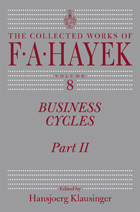
Business Cycles
Part II
F. A. Hayek
University of Chicago Press, 2012
In the years following its publication, F. A. Hayek’s pioneering work on business cycles was regarded as an important challenge to what was later known as Keynesian macroeconomics. Today, as debates rage on over the monetary origins of the current economic and financial crisis, economists are once again paying heed to Hayek’s thoughts on the repercussions of excessive central bank interventions.
The latest editions in the University of Chicago Press’s ongoing series The Collected Works of F. A. Hayek, these volumes bring together Hayek’s work on what causes periods of boom and bust in the economy. Moving away from the classical emphasis on equilibrium, Hayek demonstrates that business cycles are generated by the adaptation of the structure of production to changes in relative demand. Thus, when central banks artificially lower interest rates, the result is a misallocation of capital and the creation of asset bubbles and additional instability. Business Cycles, Part I contains Hayek’s two major monographs on the topic: Monetary Theory and the Trade Cycle and Prices and Production. Reproducing the text of the original 1933 translation of the former, this edition also draws on the original German, as well as more recent translations. For Prices and Production, a variorum edition is presented, incorporating the 1931 first edition and its 1935 revision. Business Cycles, Part II assembles a series of Hayek’s shorter papers on the topic, ranging from the 1920s to 1981.
In addition to bringing together Hayek’s work on the evolution of business cycles, the two volumes of Business Cycles also include extensive introductions by Hansjoerg Klausinger, placing the writings in intellectual context—including their reception and the theoretical debates to which they contributed—and providing background on the evolution of Hayek’s thought.
[more]
READERS
Browse our collection.
PUBLISHERS
See BiblioVault's publisher services.
STUDENT SERVICES
Files for college accessibility offices.
UChicago Accessibility Resources
home | accessibility | search | about | contact us
BiblioVault ® 2001 - 2024
The University of Chicago Press









